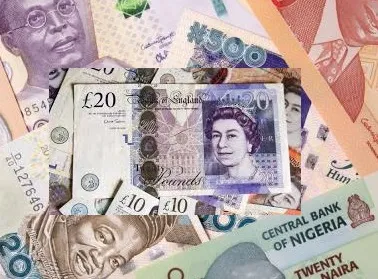The parallel market exchange rate has experienced a substantial decline, reaching a low point of N2050 per Great Britain Pound (GBP), reflecting persistent demand pressures that have contributed to the erosion of the currency’s value.
This signifies a significant decrease of 7.32% or N150 compared to the rate of N1,900 recorded the previous day.
Simultaneously, as of 11:54 am on Tuesday, black-market exchange rates have continued to undergo devaluation of the Nigerian Naira.
Despite the Central Bank of Nigeria’s (CBN) concerted efforts to enhance foreign exchange (forex) supply through various policy interventions, challenges persist within the forex market.
Similarly, the Naira depreciated against dollar in the parallel forex market, where forex is unofficially traded, with the exchange rate quoted at N1,630/$1, reflecting a 1.84% decrease from the N1,600 rate it closed at the previous day.
Additionally, the Naira weakened against the Euro by 0.57%, trading at N1750/EUR1 compared to N1740/EUR1 reported the previous day.
Factors Influencing the Depreciation
Market analysts attribute the recent decline to a consistent surge in demand for dollars that has been evident since the commencement of January. The primary contributors to this heightened demand include:
- A substantial portion of the demand is attributed to businesses actively seeking to restock goods or acquire raw materials, necessitating a higher demand for foreign exchange.
- Individuals pursuing overseas studies have also played a significant role in driving the demand for dollars. This trend is likely connected to the need for tuition payments and related educational expenses.
Nairametrics reported recently that financial analysts are advocating for a re-evaluation of policies to safeguard the Nigerian Naira amid escalating forex rates, despite efforts by the Central Bank of Nigeria (CBN) to stabilize its value.
The recent decline in the Naira’s value across official and parallel markets has prompted suggestions from financial experts to mitigate currency volatility and prevent further depreciation.
The CBN had announced a series of measures aimed at enhancing transparency and stability in the foreign exchange market while addressing malpractices.
However, while the analysts acknowledge the positive aspects of the CBN’s recent policies aimed at managing pressures in the foreign exchange market, they highlight that these measures fail to directly address the fundamental issue of limited supply.
Analysts interviewed by Nairametrics in response to the Naira’s sharp decline following exchange rate harmonization propose reassessing the government’s foreign exchange management strategy.
They advocate for shifting towards a managed float system to allow flexibility in implementing initiatives to bolster foreign exchange reserves, such as boosting oil production, enhancing agricultural exports, and incentivizing foreign remittances.
